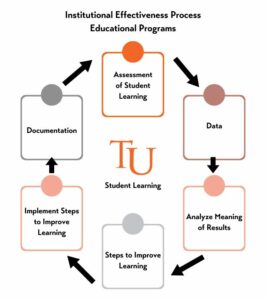The process for institutional effectiveness is methodical and systematic and common to all educational programs at Tusculum University. Department Chairs and/or Program Coordinators, when appropriate, are responsible for leading student learning outcomes assessment endeavors for all programs.
The assessment of student learning is critical to the continuous improvement of Tusculum’s academic programs and allows academic departments to evaluate the effectiveness and success of their programs and students. Assessment data is collected within specified courses and through designated assignments designed to measure student learning. Department Chairs and/or Program Coordinators are responsible for leading student learning outcomes assessment. They collaborate with faculty to analyze and interpret data and to develop action plans that utilize the results from student learning outcomes assessments. The faculty in each academic program continuously evaluate student learning and report their final assessment activities annually with a mid-year status report required early spring semester.
As part of the student learning outcomes process, data are separated according to mode of delivery. This reporting method allows the department chair or program coordinator, along with other faculty, to ensure that students in a particular course receive the same quality of instruction and opportunities for success regardless of the mode of delivery.
At the beginning of the annual institutional effectiveness process, faculty review, revise when needed, and identify additional student learning outcomes for each educational program. Meaningful student learning outcomes describe what students are expected to know or be able to do and are clear, focused, and measurable. For each outcome, faculty designate methods to assess student learning and incorporate the methods into the curriculum for each program. Each outcome is measured by a minimum of two direct assessment methods. Direct methods of assessment involve the evaluation of actual student work or performance. In addition, indirect methods of assessment may be used by some programs to further enhance data collected via direct methods and to provide information about student attainment that is not a direct observation of students’ work or performance. Indirect assessment methods include surveys, focus groups, etc.



